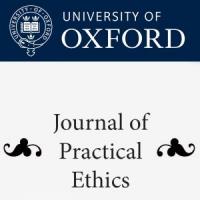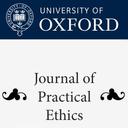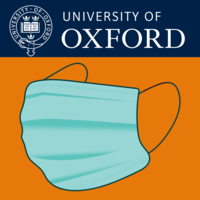Podcast Albums
Loebel Lectures: Philosophical perspectives on the causes of mental illness
Carnegie-Uehiro-Oxford Ethics Conference: Happiness and Well-Being
The Pandemic Ethics Accelerator Podcasts
The UK Pandemic Ethics Accelerator was a project to examine the ethical challenges faced during pandemics. It combined expertise from the Universities of Oxford, Bristol, Edinburgh, University College London, and the Nuffield Council on Bioethics. This six-part podcast series is hosted by David Edmonds and covers some of the themes that emerged from the research.
Audio and transcripts available at Oxford Podcasts.
Responsibility & Health Care
Disease caused by lifestyle is a pressing public health issue. Rising costs from health conditions that seem to be partly due to individual behaviour make issues of resource allocation a priority. Some people think that the right response is to direct resources to those who are not responsible for their disease, at the cost of those who are. Such proposals raise many issues. While resources are limited, the NHS is based on a principle of equal treatment for equal need. Is it right to disrupt this principle in the name of cost-saving?
Philosophers, psychologists and neuroscientists have also raised questions about the idea of freedom that underpins claims of responsibility, and of our ability to tell when people are responsible for their health. When our choices are shaped by our genes, upbringing and the broader social environment, does it even make sense to hold people responsible for their health? Or will we simply end up focusing on already stigmatised groups who need our support rather than our condemnation? Some have suggested that an inability to take responsibility is itself a health issue. In the future, we might try to enhance patients’ ability to take responsibility, strengthening their capacity for sticking to commitments and exercising willpower.
Issues of responsibility also apply beyond the question of resource rationing. Holding patients responsible might be seen as a natural partner to respecting patient autonomy. But some people think that there are limits to how far autonomy should be respected in a health care service. Patients sometimes want treatments that are harmful or unnecessary, or refuse treatments that generate considerable public good at little personal cost. Must society really respect such choices in all cases?
Medical professionals also have responsibilities and rights. How should doctors, nurses and other caregivers behave when they object to providing a treatment on moral grounds?How should society and the healthcare system treat them?
These pressing issues, among others, are the subject of this series of podcasts. The series is part of a broader project, funded by the Wellcome Trust and led by Professor Julian Savulescu, on Responsibility and Health Care.
Should obese people be held responsible for being overweight?
Suppose an obese person requires a hospital procedure for a condition that is in part linked to their obesity. Many people might believe that a patient must bear responsibility for being overweight. And, other things being equal, that's a reason to prioritize the needs of another patient first. So is the concept of responsibility a useful one in determining how to distribute health resources. Becky Brown is not convinced.
Becky Brown is a philosopher at Oxford's Uehiro Centre for Practical Ethics, University of Oxford. Becky's work focuses on the ethics of health promotion, particularly questions about responsibility for unhealthy behaviour. This research involves considering how philosophical theories can be informed by evidence from the social and medical sciences and vice versa. Ultimately, the aim of this work is to better understand what kinds of approaches to encouraging healthy behaviour are justified.
Released 10 June 2019
Should patient autonomy always be respected?
A fundamental value of modern medicine is patient autonomy. Doctors should not insist upon a medical procedure or impose a procedure on a patient. The patient's consent - or the consent of a parent or guardian - needs to be obtained. But are there any exceptions to this basic principle. Alberto Giubilini argues that there are....
Alberto Giubilini is a Research Fellow at the University of Oxford, working on the Oxford Martin Programme on Collective Responsibility for Infectious Disease. He is based at the Uehiro Centre for Practical Ethics and at the Wellcome Centre for Ethics and Humanities. He has a PhD in Philosophy from the University of Milan, and prior to joining Oxford he worked in Australia at Monash University, University of Melbourne and Charles Sturt University. He has published on different topics in bioethics and philosophy, including a recent on The Ethics of Vaccination (Palgrave MacMillan 2019).
Released 24 June 2019
Normally, when we say that somebody is addicted to a substance, like a drug, we believe it is because they have lost control - they don't have the ability to resist their desire for it - even if they at some level still believe it is harmful to them. And to some extent, we are inclined to say, they are no longer responsible for surrendering to this desire. But Neil Levy says science should force us to reconsider the link between control, responsibility and belief.
Neil Levy is Professor of Philosophy at Macquarie University, Sydney, Australia, and a Senior Research Fellow at Oxford's Uehiro Centre for Practical Ethics, University of Oxford.
Released 8 July 2019
What is the link between responsibility and effort?
Compare the athlete who finds training really tough but does it anyway, with the athlete who takes a substance that makes training easier. We tend to think that people who strain hard to achieve their goals are more deserving of praise than those for whom it is effortless, or who take advantage of shortcuts. Hannah Maslen believes this intuition is mistaken.
Hannah Maslen is the Deputy Director of the Oxford Uehiro Centre for Practical Ethics, University of Oxford. Hannah works on a wide range of topics in applied philosophy, from neuroethics, to moral emotions and criminal justice. Hannah is currently the Editor-in-Chief for the journal Neuroethics.
Released 22 July 2019
Should doctors be allowed to deny a medical procedure to patients on grounds of conscience? Some doctors believe abortion to be wrong. Should they be permitted to turn away a woman who wants a legal abortion? Dominic Wilkinson is both a philosopher and a physician.
Dominic Wilkinson is Director of Medical Ethics and Professor of Medical Ethics at Oxford's Uehiro Centre for Practical Ethics, University of Oxford, UK. He is a consultant in newborn intensive care at the John Radcliffe Hospital, Oxford, holds a health practitioner research fellowship with the Wellcome Trust, and is a senior research fellow at Jesus College Oxford.
Release date 5 August 2019
If two people have a medical condition that requires treatment and John is responsible for having the condition, but Janet is not, then some people believe that Janet should take priority. Janet should be treated first. But benefiting Janet in this way only really makes sense if we are first clear what we mean by John being ‘responsible’ for his condition.
Ben Davies is a postdoctoral research fellow on Professor Julian Savulescu's Wellcome Trust project on the relevance of personal responsibility to healthcare policy. His primary research focus is on issues in medical resource allocation. He completed his PhD at King's College London in 2015, working on ethical issues related to enhancements targeting human ageing.
Release date 19 August 2019)
Interviews by David Edmonds (UCI Distinguished Research Fellow & Consultant Researcher).
The podcast series is a collaboration between Philosophy 24/7 and the Oxford Uehiro Centre for Practical Ethics.
Philosophy 24/7 brings you concise interviews with leading philosophers about pressing moral, political and social questions and is hosted by David Edmonds, a multi-awarding winning BBC journalist, and one half of the duo behind the Philosophy Bites podcast.
We are grateful to the Wellcome Trust for funding the project.
Uehiro Oxford Institute: Special Lectures and Seminars

A selection of seminars and special lectures on wide-ranging topics relating to practical ethics. The Oxford Uehiro Centre for Practical Ethics was established in 2002 with the support of the Uehiro Foundation on Ethics and Education of Japan. It is an integral part of the philosophy faculty of Oxford University, one of the great centres of academic excellence in philosophical ethics.
Annual Uehiro Lectures: Practical solutions for ethical

The annual public Uehiro Lecture Series captures the ethos of the Uehiro Centre, which is to bring the best scholarship in analytic philosophy to bear on the most significant problems of our time, and to make progress in the analysis and resolution of these issues to the highest academic standard, in a manner that is also accessible to the general public. Philosophy should not only create knowledge, it should make people’s lives better.
Oxford Podcasts | Apple Podcasts
Thinking Out Loud

Our new Thinking Out Loud podcast series. Philosophers and other experts discuss ethical issues raised by the corona-crisis with Katrien Devolder.
Practical Ethics Bites

Practical Ethics Bites is a series of audio podcasts on practical ethics targeted specifically at pupils studying philosophy in UK schools. It is produced by the team behind the popular podcast Philosophy Bites, David Edmonds and Nigel Warburton. Philosophy Bites has had over 21 million downloads. David Edmonds is a Senior Research Associate at Oxford’s Uehiro Centre for Practical Ethics and all the interviewees are academics linked to the Uehiro Centre. The series aims to be a free educational resource for teachers. Each interview is around 20 minutes long.
Journal of Practical Ethics

The Journal of Practical Ethics, an open access journal in moral and political philosophy (and related areas), published by the Oxford Uehiro Centre for Practical Ethics, located at the University of Oxford. In this series, an author from each issue of the journal presents an overview of their paper in conversation with Dave Edmonds of Philosophy Bites.
Loebel Lectures: Philosophical perspectives on causes of mental illness

The Oxford Loebel Lectures and Research Programme (OLLRP) were established in 2013 with the generous support of J. Pierre Loebel, Clinical Professor Emeritus of Psychiatry and Behavioral Sciences at the University of Washington, and Felice Loebel. The purpose of OLLRP is to address the shortcomings of a unilinear approach to mental illness that arise from focusing uniquely on biological, psychological or social factors. OLLRP will work towards delineating the nature and magnitude of biopsychosocial interactions in the causation, evaluation and management of mental states, normal and abnormal, going beyond a simple checklist of contributing factors to arrive at an understanding of how the interactions between factors affect one other and configure the whole. Through a series of six Loebel Lectures held over three years, excellent research, and clinical impact, we aim to present and review the best evidence of causal interaction between biopsychosocial factors, philosophically analyse the conceptual relationships between them, and lay the ground work for a unified theoretical basis for psychiatric practice.
2013 Carnegie-Uehiro-Oxford Ethics Conference: Happiness and Well-Being

Many people and countries are now beginning to evaluate the success of their lives or society not purely in terms of money or gross domestic product. The currency of traditional economics - preference satisfaction - has fallen into question as an ethical
value. The global financial crisis is seen by many as a failure of capitalism. Some countries have proposed a Gross Happiness Index to replace GDP as the measure of the productivity of a country. What is of intrinsic value in human lives? How should
we measure how good a human being's life is? What is happiness and what constitutes well-being? What can we learn from religion, philosophy, economics and the cognitive sciences about happiness and well-being? Are happiness and well-being relative
to culture? What roles do pleasure and happiness play in ethics? Should we aim to maximise happiness and pleasure? How should the views of people with disability be incorporated into an ethics of well-being? Jointly organised by The Uehiro Foundation
on Ethics and Education (Tokyo), The Carnegie Council for Ethics in International Affairs (New York) and Oxford Uehiro Centre for Practical Ethics (University of Oxford) this conference will seek to understand the nature and value of happiness and
well-being in practical ethics.












